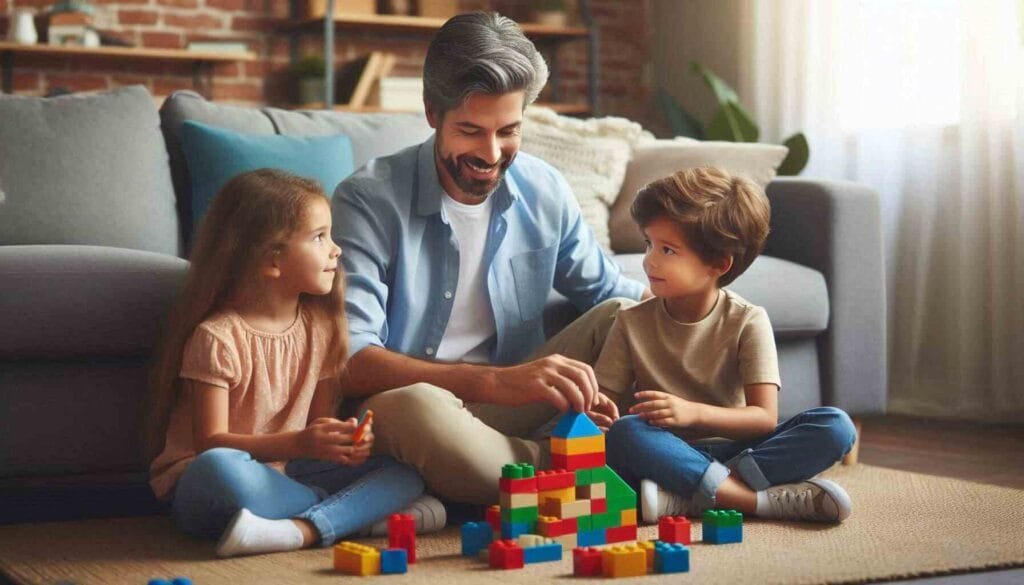Mean kids can be a tough challenge for parents and children alike. It’s natural to feel worried when your child faces unkind behavior from peers. The good news is that you can help your child navigate these situations. By teaching your child how to respond to mean behavior, you give them valuable skills for life.
Talking to your kids about mean kids starts with listening. Let your child share their feelings and experiences. This helps them feel heard and supported. You can then discuss ways to handle mean behavior. These might include using words to stand up for themselves or seeking help from a trusted adult.
Remember that your child looks to you as a role model. Show them how to treat others with kindness and respect. This sets a positive example they can follow in their own interactions with peers.
Key Takeaways
- Listen to your child’s experiences with mean behavior
- Teach your child ways to respond to unkindness
- Model kind and respectful behavior yourself
Understanding the Dynamics of Bullying
Mean behavior and bullying can take many forms. Kids may face different kinds of unkind actions from their peers. Knowing what to look for helps you talk to your children about these issues.
Defining Bullying and Mean Behavior
Bullying is repeated harmful actions toward someone. It can be physical, verbal, or social. Mean behavior might be a one-time event. It can still hurt but isn’t always bullying.
Types of bullying include:
- Physical: Hitting, pushing, taking belongings
- Verbal: Name-calling, insults, threats
- Social: Spreading rumors, excluding others
Mean kids might tease once or twice. Bullies keep doing it over time. Both can make your child feel bad.
The Impact of Unkind Behavior on Children
Unkind actions hurt kids in many ways. Your child might feel sad, scared, or alone if bullied. They may not want to go to school. Some kids have trouble sleeping or eating.
Bullying can lead to:
- Low self-esteem
- Anxiety or depression
- Poor grades
- Physical health problems
Victims may struggle to make friends. They might think the bullying is their fault. It’s important to tell kids it’s never okay to be mean. You can help build their self-awareness and confidence.
Fostering Communication and Emotional Intelligence

Talking to your kids about mean behavior helps build their social skills and emotional strength. These tools will serve them well in handling tough situations.
Encouraging Open Conversations
Start by making your home a safe space for open talks. Let your kids know they can come to you with any problem. Ask questions like “How was your day?” or “Did anything make you happy or sad?”
Listen without judgment when your kids share. This builds trust and creates a safe space for self-expression. Show you’re paying attention by nodding or saying “I see.”
Use “I” statements to share your own feelings. This teaches kids how to express emotions clearly. For example, say “I feel worried when you’re upset” instead of “You’re being too sensitive.”
Developing Emotional Intelligence in Children
Teach your kids to name their feelings. Use simple words like happy, sad, angry, or scared. As they grow, introduce more complex emotions like frustrated or anxious.
Help your children understand others’ feelings. Ask “How do you think your friend felt when that happened?” This builds empathy and social awareness.
Practice coping skills together. Try deep breathing or counting to ten when upset. These techniques help kids manage strong emotions.
Role-play different social situations. This boosts confidence in handling real-life challenges. Act out how to respond to a mean comment or join a group activity.
Strategies for Empowering Your Child
Empowering your child helps them deal with mean kids. It builds inner strength and teaches practical ways to handle tough situations.
Building Self-Esteem and Resilience
Start by praising your child’s efforts and strengths. This builds confidence. Point out times when they’ve been brave or kind.
Make a list of your child’s good qualities together. Put it where they can see it often. This reminds them of their worth.
Encourage your child to speak their mind. Listen without judging. This shows their thoughts matter.
Teach positive self-talk. Help your child replace “I can’t” with “I’ll try.” This builds resilience.
Set small, achievable goals. Celebrate when they reach them. This proves they can overcome challenges.
Role-Playing Scenarios
Practice responses to mean behavior. Act out different situations at home. This prepares your child for real-life encounters.
Try these steps:
- Describe a mean kid scenario
- Ask your child how they’d respond
- Offer suggestions if needed
- Practice the response together
Talk about body language. Show how to stand tall and speak clearly. This projects confidence.
Create an action plan together. Write down steps to take when faced with meanness. Keep it simple:
- Walk away
- Tell a trusted adult
- Use “I” statements
Practice often. This builds your child’s skills and confidence over time.
Navigating Social Interactions and Conflicts
Kids need tools to handle tricky social situations. Learning to resolve conflicts and show empathy helps build stronger friendships.
Teaching Conflict Resolution Skills
Conflict resolution starts with helping kids calm down. Teach them to recognize their emotions and use strategies like deep breathing.
Once calm, guide them to find the source of the conflict. Help them express their feelings using “I” statements.
Encourage kids to listen to others’ perspectives. This builds understanding between both sides.
Brainstorm solutions together. Ask your child to think of ways to solve the problem that work for everyone.
Practice these skills through role-play. Act out common scenarios to help your child feel more prepared.
Understanding the Role of Empathy in Conflicts
Empathy is key in resolving conflicts. Teach your child to imagine how others might feel.
Ask questions like “How do you think your friend felt when that happened?” This helps develop perspective-taking skills.
Encourage your child to show kindness to others. Suggest ways they can include kids who seem left out.
Model empathy in your own actions. When conflicts arise at home, demonstrate how to consider others’ feelings.
Praise your child when you see them being empathetic. This reinforces the behavior and its importance in friendships.
Creating a Supportive Environment
A supportive home and community are key to helping kids deal with mean behavior. You can build a strong foundation by showing love and getting involved locally.
Providing Unconditional Love and Support
You can create a safe space at home for your child. Show unconditional love by listening without judgment. When your kid talks about mean kids, pay attention.
Ask questions to understand what happened. Validate their feelings. You might say “That sounds really hard. I’m sorry you went through that.”
Give hugs and comfort. Let your child know you’re always there for them. Your support helps build their confidence to face tough situations.
Teach coping skills. Practice ways to respond to mean behavior. Role-play scenarios to build your child’s confidence.
Engaging with the Community
You can help your child by getting involved locally. Talk to teachers about school policies on bullying. Ask how they handle mean behavior.
Join or start a parent group focused on kindness. Work with the school to create anti-bullying programs. These teach all kids to be nicer.
Encourage your child to join clubs or sports teams. This helps them make friends outside of school. A wider social circle provides more support.
Set up playdates with kind kids. This gives your child positive social experiences. It shows them what good friendships look like.
Frequently Asked Questions
Parents often wonder how to help their children navigate difficult social situations. These questions address common concerns about dealing with mean behavior, supporting kids through challenges, and addressing unkind actions.
What can I say to my child when they encounter mean behavior from peers?
Listen to your child and validate their feelings. Say “I’m sorry that happened to you. It’s not okay for others to be mean.” Encourage them to talk about what occurred. Ask how they handled it and praise their efforts to stand up for themselves.
Brainstorm ways they could respond next time. Teach phrases like “Please stop, I don’t like that” or “That’s not kind.” Remind your child that the other kid’s behavior isn’t their fault.
How should you deal with another child being unkind to your child?
Stay calm and avoid confronting the other child directly. Talk to your child’s teacher or the other parent if the behavior is ongoing. Teach your child coping strategies like walking away, using humor, or finding a friend.
Role-play responses with your child. Help them practice assertive communication. Encourage them to spend time with kind friends who treat them well.
What could be causing my child to act mean towards me yet be kind to others?
Children sometimes act out at home because they feel safe expressing emotions there. Look for triggers like stress, fatigue, or big changes. Set clear expectations for respectful behavior.
Ask your child if something is bothering them. They may need help processing feelings. Spend positive one-on-one time together to strengthen your bond.
How can you support your child when their friends treat them poorly?
Listen without judgment and empathize with your child’s feelings. Help them identify true friends who are consistently kind. Encourage them to set boundaries and speak up when treated badly.
Teach your child to value themselves. Build their self-esteem through praise and quality time. Help them find activities where they can shine and make new friends.
How do you address your child’s mean or rude behavior towards their peers?
Talk to your child privately about the specific behavior. Ask why they acted that way. Explain how their actions affect others. Set clear consequences for mean behavior.
Help your child make connections between their actions and outcomes. Role-play kind ways to interact. Praise them when you see them being kind to others.
What should you do when your child is being ridiculed by others?
Take your child’s concerns seriously. Document incidents if bullying is ongoing. Speak to teachers or other adults who can help address the situation.
Teach your child to respond assertively. Practice comebacks like “That’s not cool” or “I don’t like it when you say that.” Build their confidence through activities they enjoy.





